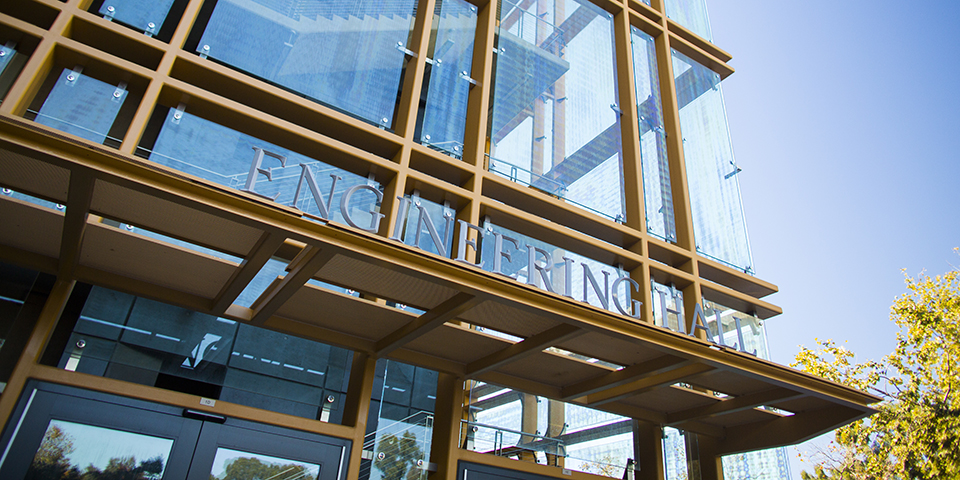The Henry Samueli School of Engineering
About the school

Founded as the School of Engineering in 1965 with just three faculty members and 75 students declaring engineering majors; the school today serves more than 4,000 students, providing an integrative approach that blends fundamentals, research and hands-on experience. With 12 undergraduate and 13 graduate programs, the school's mission is to unleash innovation, create opportunities and inspire ingenuity.
In 1999, the school was renamed The Henry Samueli School of Engineering after the philanthropist and co-founder, chairman and chief technical officer of Broadcom Inc.
The school includes six academic departments: biomedical engineering; chemical & bimolecular engineering; civil & environmental engineering; electrical engineering & computer science; materials science & engineering; and mechanical & aerospace engineering. Leaders in their disciplines, the school's 151 faculty members have achieved worldwide recognition for their pioneering research and dedicated teaching. Nearly a third are fellows in professional societies, and 14 are members of the National Academy of Engineering. The school has 10 endowed chairs/professorship, 18 Distinguished Professors and five Chancellor's Professors.
Magnus Egerstedt, Dean
Magnus Egerstedt has been appointed the Stacey Nicholas Dean of The Henry Samueli School of Engineering, effective July 19, 2021.
Professor Egerstedt has served as a professor in the Georgia Institute of Technology’s School of Electrical and Computer Engineering since 2001 and as the Steve W. Chaddick School Chair since 2018. He has held a range of academic leadership roles, including executive director of Georgia Tech’s Institute for Robotics and Intelligent Machines. He also co-directed the campuswide Georgia Tech Diversity and Inclusion Fellows Program and held secondary appointments in mechanical engineering, aerospace engineering and interactive computing.
As the school chair, he focused on recruiting the best, most diverse students, faculty and staff; fostering a collaborative and inclusive work environment; and partnering with a range of stakeholders across campus to enable and promote high-impact, multidisciplinary research and scholarship. Major accomplishments during his tenure include establishing a 15,000-square-foot maker space dedicated to electronics, embedded processors and analog devices, as well as a remotely accessible robotics lab used by over a thousand research labs worldwide. He also supported fundraising efforts for endowed chairs, junior professorships targeting diverse new faculty, graduate fellowships and student-led initiatives.
An expert in the areas of control theory and robotics whose research emphasis is the control and coordination of multi-robot systems, Professor Egerstedt holds a Ph.D. in applied mathematics from the KTH Royal Institute of Technology in Stockholm. He is a foreign member of the Royal Swedish Academy of Engineering Sciences and a fellow of both the Institute of Electrical and Electronics Engineers and the International Federation of Automatic Control.
He has received a number of teaching and research awards, including the John R. Ragazzini Education Award from the American Automatic Control Council, the O. Hugo Schuck Best Paper Award from the American Control Conference, the Outstanding Doctoral Thesis Advisor Award and the HKN Outstanding Teacher Award from Georgia Tech, and the Alumnus of the Year award from the KTH Royal Institute of Technology.
Corporate Partnerships
The Samueli School fosters partnerships with the corporate community to enhance the flow of research, technology, talent and personal contact between the school and high-tech companies. The Corporate Partners Program is offered to ensure that the Samueli School builds lasting relationships that cultivate technological excellence and innovation while creating opportunities to share knowledge.
Focused Research
Research is integral to the school's mission to educate students and benefit society. Engineering professors and researchers collaborate across disciplines and geographic boundaries, nationally and internationally, to pursue new ideas and bring cutting-edge projects to fruition. The school actively seeks to assist those interested in commercialization, as well, helping them bridge the gap between the lab and the marketplace. And students use the school’s myriad facilities to gain hands-on experience in engineering research procedures and processes; more than two-thirds of undergraduate students actively participate in faculty-led research.
Faculty members pursue exploration in four principal research thrusts: environmental sustainability, human health, materials and manufacturing, and mobility and communications. The school’s experimental spaces and computational infrastructure occupy 295,000 square feet and include the following wide-ranging assortment of research centers, institutes and lab facilities.
Environmental Sustainability
- Advanced Power and Energy Program (APEP)
- Center for Hydrometeorology and Remote Sensing (CHRS)
- Water-Energy Nexus Center
Human Health
- Beckman Laser Institute and Medical Clinic
- Center for Advanced Design and Manufacturing of Integrated Microfluidics (CADMIM)
- Center for Synthetic Biology
- Edwards Lifesciences Center for Advanced Cardiovascular Technology
- Laboratory for Fluorescence Dynamics
Materials and Manufacturing
- Advanced Casting Research Center (ACRC)
- Center for Complex and Active Materials (CCAM)
- Integrated Nanosystems Research Facility (INRF)
- Institute for Design & Manufacturing Innovation (IDMI)
- Irvine Materials Research Institute (IMRI)
- Materials Discovery and Synthesis Center (MDSC)
- World Institute for Sustainable Development of Materials (WISDOM)
Mobility and Communications
- Center for Embedded Computer Systems (CECS)
- Calit2 (California Institute for Telecommunications and Information Technology)
- Center for Pervasive Communications and Computing (CPCC)
- Institute of Transportation Studies
- ProperData Center
By the Numbers (2019-20)
- Full-time faculty: 151
- Undergraduate enrollment: 3,695
- Graduate enrollment: 926
- Ranked 38th in U.S. News & World Report's current listing of best engineering graduate schools
